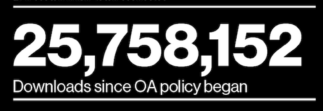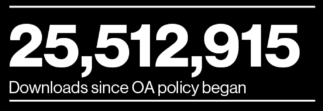Benjamin Mako Hill, a graduate student in the Media Lab’s Computing Culture group, coordinated the February 15th “Student Day of Action for Open Access†at MIT. Following the successful “Overprice Tags†event, Hill spoke with Ellen Duranceau, Scholarly Publishing and Licensing Consultant in the MIT Libraries, about how he came to be involved in the open access (OA) movement, and why it matters to him as a student, author, programmer, and reader.
 |
Hill’s involvement in open access issues is not new. He began writing free software when he was 12, was inspired as an eighth-grader by Richard Stallman’s writings about free software, and became involved in open access to scholarly research through two events in the past year: attendance at the Access to Knowledge conference last year at Yale Law School, and his related research project for a class at the Kennedy School at Harvard, which was comparative analysis of the Access to Essential Medicines movement and OA. In carrying out this project, Hill says he “learned a huge amount about OA and [I] have been a big fan since.â€
Hill: I think that cultural works, knowledge, and information should be free. Free software has very good definitions of what is free. … The OA movement makes a series of strong normative claims about what should be free and backs these up with compelling argument and evidence. That’s the kind of movement that I think is likely to be successful and it’s the kind of movement that I want to be a part of. Libraries: You are an author of articles as well as code; how do your views about open access relate to your own works — where you choose to publish, how they are made available? |
Hill: I have never written code that I have sold. That means that I’ve not been able to make as much money writing code as I might have — but I think that’s OK … Being an author is a little trickier. I write both academic papers and technical books regularly which, economically, are very different beasts. I’ve only started to publish academically so I’m still thinking about the range of possibilities but I’m looking forward to supporting OA in any way that I can; I want any papers I produce to be distributed openly. In terms of technical books, I’ve worked hard and been lucky there as well. My last book was the best selling book on Linux for most of last year and is under a Creative Commons “Attribution-Share Alike†license. It’s possible that I didn’t make as much money off the book as I might of. Then again, I think much of the book’s success was due to the fact that it was open.
Libraries: In your paper “How free became open and everything else under the sun,” you argue that “Free Software exists as a politically agnostic field of practice” and that its philosophy can be translated “into the terms of radically different, even oppositional, social and political movements.” Do you think this true of the open access movement in scholarly publishing, too?
Hill: Sure. OA benefits a variety of different people. MIT administrators might support OA for purely financial reasons. I support it because that I think that it is wrong to deprive people of a good that could be had by everyone, everywhere, for the same cost that it is had by anyone. Those are very different perspectives but I’m happy that OA is defined in such a way that we can work together toward an overlapping goal.
Libraries: Is there a common misconception you find related to the open access movement that you would like to dispel?
Hill: I think that the term open access is unfortunate because it makes people think that the movement is much broader than it is. … In fact, OA is focused on a limited area and has answers to all of the hard questions already. … [T]here are compelling OA journals offering an example of how we can do it and what exactly it will take.
Libraries: Why should students become involved in this movement?
Hill: For undergrads, it’s your tuition that pays [for high-priced journals and a system that suffers from barriers to access]. More important though, it’s unfair. We should fix this for ourselves because that’s going to be more convenient but we also have an ethical obligation to fix this so that people who can’t go to MIT, and that’s most people, can access these resources where possible. Once we’ve edited a journal, it doesn’t cost anything to let everyone in the world view it. Why doesn’t this happen? When other people are [choosing to set up barriers to] their [own] work, that’s one thing. But [publishers are] also doing it with *our* work and they are not giving us a choice to act otherwise.
Libraries: Thanks for taking the time to share your thoughts about open access to research, and your motivations for leading the “Student Day of Action for Open Access.†We will be eager to see what other events and activities MIT Free Culture takes on.

